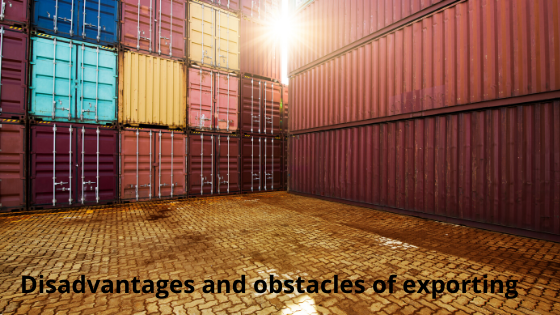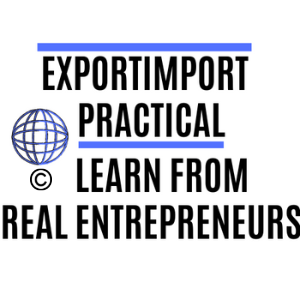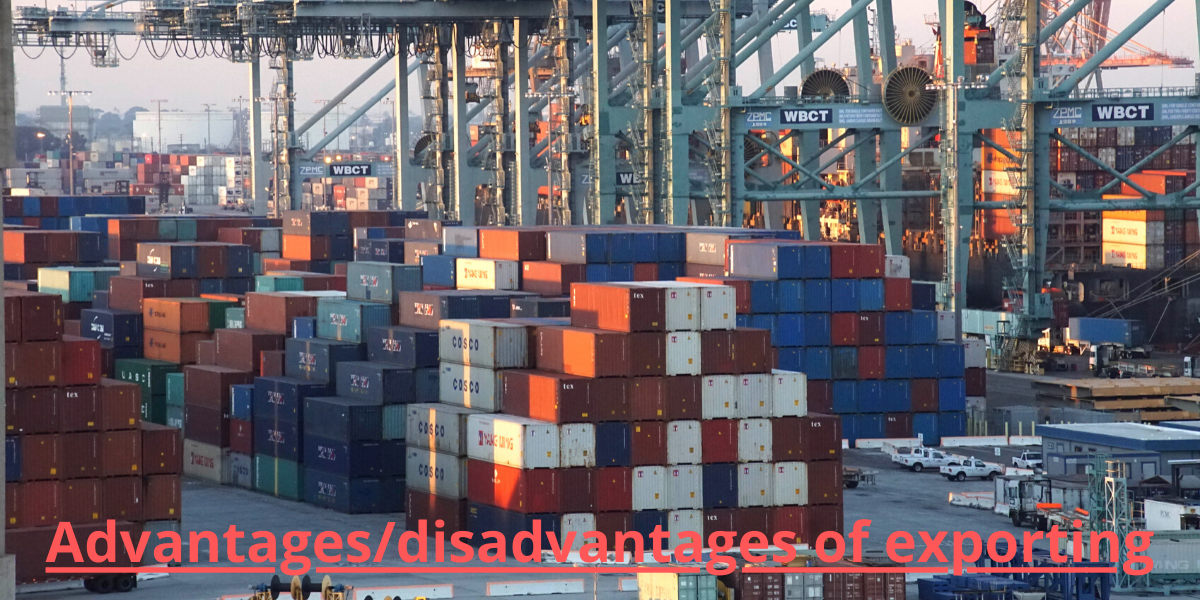The export-import business can be one of the most profitable businesses if planned properly. The import-export business can be business, nowadays many young people choose when starting their first business. Especially people from developing and emerging countries in Asia, Southeast Asia, and Africa.
However, the disadvantages and advantages of exporting and/or importing are the concerns for new starters. That’s why we would like to invite you to read the following article to have a more objective view of the Exim-business that is being concerned by many young entrepreneurs.
First, we will explain the main disadvantages and obstacles for exporting business, later we will discuss the advantages of exporting and the benefits it can give to your business.
NB! If you are new for export-import business and looking to start one, enroll our course below:
Related reading: import-export business, should you really start it?
The role of the export-import business
As we know the export-import of goods appeared early in world history. It is a trading activity on a regional scale (international). It is not a single-sided, unilateral act of trading, it is a whole system of trading relations in the global trade. Here are many international parties involved: import-export companies, shipping companies, different countries institutions like customs, indirectly also the world trade organization (WTO), which is creating the framework for international trade.
About importing
Importing is an important activity of international trade, where one country,s trading company imports products/services from another. It affects directly and decisively the importing-countries production sectors, economy, and life of the people.
Imports are also taxed by countries, meaning that importing is not as profitable as exporting (but there are exemptions). Importing is important as it will positively impact the balanced development and helps using the potential and strengths of the importing country’s economy.
However, if one country relies too much on imports, it will cause fiscal deficits and stagnates the country’s own industries.
PS! Read, how we made 100K when importing from China.
About exporting
Exporting is an international business activity, where one exports products to overseas countries, to get greater profits than possible on the local market. It is the main means to boost the country’s economy and create a fiscal surplus. Expanding exports is crucial to increase foreign currency earnings, creating favorable conditions for imports and developing jobs for people.
The disadvantages of an exporting

Entering into any kind of business you will have to face the specific challenges and the difficulties. the import-export business has different challenges than the local business. In the following, we will look at the cons of exporting.
1.The dynamics of export markets
Not all of the items in your country will be easy to export. Exporting to foreign markets requires a lot of planning, effort, and analysis. Sometimes things are not under your control. For example, when the demand from foreign markets is declining, but the supply will increase because the output of major producing countries is still increasing, then it can be very difficult to find new customers with a satisfactory price-level. This is a global competition.
In fact, most of the private export enterprises participating in the export business, are small-scale enterprises with low turnover and limited ability to self-promote their products to find markets and customers.
With weak competitiveness, many businesses lost their orders. Moreover, many businesses have not paid adequate attention to export marketing and promotion and market expansion. Usually, small companies don’t have departments directly involved in dealing with partners, procedures such as sample introduction, orders, invitations, etc. Those stages must be through intermediaries doing logistic services
To survive and expand, the exporter must put great efforts into international marketing. For you as an exporter, getting export orders and fulfilling these as well as possible, is the most important lesson.
Also, in international business, it is crucial, that one is dealing with the commodities with what he has a competitive advantage! Because along with the rapid, complicated and unstable transformation of the market, if you want your business to survive, it is inevitable that you supply something which is valuable and competitive on that market.
2.The right products and the right market
It is difficult enough to find the right product for a specific market. There require many things to be accomplished: market research, research of other enterprises that provide similar products, indicating the pros and cons consumers have been pointing out regarding their existing products. There is fabricating or finding the existing product that remains the pros of the existing products yet overcomes the cons of the previous ones.
The difficulties in one market will not necessarily be the same in another market. After the series of hard work in order to have a successful product in one area, one might have to repeat and to even compare and contrast the two markets when venturing into a new area. Pre-assuming that a successful product in one place shall be the same in another can lead to major loss of money, as the result may not be the same.
Therefore, it is critical to study your product and the markets you plan to venture into. Keep in mind the citizens’ needs, and the complexity of cultural differences. Never assume a thing, every assumption must be proved.
We advise for every exporter, to conclude and put together a comprehensive export business plan.
Read also: Indias top export products
3.The tariffs
Export taxes are enacted by the government to manage exports in a way that is most beneficial to the country. This tool is usually applied only to very few export items to supplement the state budget and restrict exports to fully meet the domestic consumption demand for such goods.
In addition to export duties, more importantly, the import tariffs also have an impact on business performances. An import tariff is a tariff that the importing country imposes on one unit of import. Therefore, it will increase the total costs for the enterprises who are doing the importing. If one country rises the import duty significantly, it will reduce the volume of the product(s) entering into that country. USA- China trade war is an ideal proof and example of this.
4. The quotas
Quotas are construed as state regulations on the highest number of items or groups of enterprises that are permitted to be exported or imported. The exporting country will set an export quota to adjust the number of exports and improve export efficiency.
The importing country will set an import quota to limit the number of goods imported into the country, to protect domestic production, resources and improve the balance of payments. Like tariffs, both export and import quotas can be a disadvantage for your exports, sometimes limiting your growth.
5. The technical standards
In addition to the tariff and quota instruments, there is another more sophisticated tool increasingly used by many countries. It is the setting of quality standards and techniques for imported products. This non-tariff measure also aims to limit the amount of import and export goods of the business. The requirement of meeting foreign standards can be the biggest obstacle or disadvantage of exporting if you are a small entrepreneur.
In order to export to Europe for example, most of the developing countries’ businesses are still unable to meet strict food safety and quality regulations. Facing the trend of global integration, the wave of import is growing strongly, all import and export companies must have methods to comply with strict food hygiene and safety regulations.
6. The currency exchange rate
The exchange rate is the purchasing power of one currency against another. The purchasing power of a currency is the solvency of a monetary unit with a certain quantity of export goods associated with international payment. In international payment, people often use strong currencies like USD to pay.
If the exchange rate rises, which is equivalent to the increase in the value of a foreign currency against the local currency, then export activities will be encouraged. Conversely, if the exchange rate decreased, it would inhibit the development of export activities.
For example, the US-China trade war has caused the Yuan to depreciate significantly against the US dollar, helping enterprises to import cheaper textile and fabric materials from China. It also helped China companies to get more orders, even the big tariffs were in place on the USA side.
In the near future, the US-China trade war will spread, commodities such as fabrics and yarns will affect firstly and directly, this is an opportunity for the domestic textile industry.
China can locate the production facilities to the neighboring countries to take advantage of labor costs, trade and detour into the United States. International economic integration is gradually reducing tariff barriers to facilitate exports but limits by non-tariff technical barriers such as quality standards, models, brands and product specifications, the origin of goods will remain.
7. Relationships with partners
Most of the businesses themselves perform all stages of the import and export processes and activities. This will lead to businesses will take a lot of time and sometimes have difficulties from the partner. Therefore, please pay attention to establishing and maintaining good relationships with professional partners such as cargo transportation, customs services, banking, customs services, representation attorneys.
In our exporters/importers guide, we have listed some trusted companies with whom you can work.
8. The national infrastructure systems
The national infrastructure system also has a great impact on exports. A country with a developed system of roads and bridges will contribute to promoting products and improving the ability of enterprises to participate in the international trade market. Especially, wharves, railway stations, and ports have a direct impact on the export activities of enterprises.
If this system is built in accordance with the general requirements of the international market, it will be a positive factor affecting the export activities of enterprises. In contrast, the system of seaports, railway stations and unloading stations that do not meet the minimum technical requirements will cause suspicion from foreign partners and it is likely that they will lose some export-import opportunities.
So, this is a case mostly for less developed countries in Africa, Southeast- Asia.
9. The financial capability
Some exporters have not been properly aware of the importance of prices in global markets, the competitiveness is still low. Much of the pricing is based on competitors’ prices. The exporters have not been really active in researching the market needs to formulate price strategies.
The working capital of exporting enterprises is still low. This means the purchasing and stocking of goods are limited, this is also the reason why exporting enterprises have not been able to take the initiative in pricing. Moreover, due to the low ability to rotate working capital, the exporters are always in a state of running out of capital, although having mortgaged assets to borrow from banks still cannot guarantee business capital for businesses.
To do international trade, requires significantly more working capital (cash) than doing the local business. But there are many ways, to overcome this problem if the profitability of your business is high enough.
10 The complex procedures and documentation
Complex procedures and documentation in export-import business is sometimes the biggest barrier for the exporters-importers today. The procedure is still cumbersome, lack of transparency, the attitude of civil servants is not appropriate, lack of objective … makes businesses costly and difficult.
Until now, the exporters-importers still have to struggle with public authorities on administrative procedures. Not only that, some national policies are changed abruptly to disadvantage for some specific industry export-import companies.
This is also the case for most nations of Africa, south-east Asia, and Asia general.
Although the import-export business has disadvantages, it has significant advantages which will out-weight the disadvantages, these advantages will be the motivation and goals which are worth your effort.
Complex procedures and documentation also create some risks for your business. Risk can occur if you fill some documents improperly or miss it at all. Also, the contracts must be well crafted. Read also: risks in export-import business and how to overcome these.
The advantages of exporting

With the trend of globalization and economic integration, the exporters-importers have a chance to absorb scientific and technological achievements and advanced management methods from developed countries, which will bring great benefits for their exporting business.
Also, improving and perfecting production lines in the direction of industrialization, automatization and modernization will help businesses reduce costs. It will also help to create new products with quality and variety of designs, packaging, etc. These all are providing conditions for domestic companies to trade with foreign enterprises.
Exporting is a big opportunity for domestic companies to expand and raise their revenues and profits.
1. Advantages in business opportunities, and business development
There are endless export-import business ideas and opportunities, but not every business is going to have a smooth and easy success. But the import-export business itself is an open forum for all who want to start it. You don’t need to have a perfect background, you don’t need a college degree, you don’t need to come from a business school. In this business, career opportunities and income are completely open and there are no limits!
Why can we say so frankly? Simply, suppose you are a coffee beverage seller, at least you have to open a coffee shop, or you are a real estate trader, you also need to have an office. That’s obvious.
But, when you start importing and exporting, what you need, is a great product at a competitive price. Customers from other countries don’t care how nice your office or your shop is, what they care about is the product that meets their needs and your customer service attitude for them.
Moreover, today online there are many types of import and export business training programs and courses created by highly trained and professional people with rich business experiences. These training and programs can help you start your import and export business and makes it for you a simple, easy, cost-effective and limits the risks incurred. You can use a portion of the profits to pay for the training, which won’t cost you too much, but you will get even more profit in the future.
And most importantly, then the world is more open than ever before. Every country has a border, but it is possible to sell your products all most every country in the world. In the 18-century to the middle of 19-century, it was not possible.
2. Limitless market– the main advantage of exporting
Selling your products only in your home country is hard because the market is limited by the size of your local country market. Exporting products aborad, however, gives you basically a limitless market opportunity. The global market or even regional market can be so huge, that for a small and medium-size company it is basically limitless.
Foreign markets are huge and every small/medium size exporter, should plan properly and target the selected countries at a time, not all at the same time.
Also, the order volumes in the foreign markets can be much bigger than in the local market.
Limitless market and benefits it can give, compared to the local markets are the main advantages of exporting. It is also important to understand, that the more you export, the more advantages of exporting and benefits you will get.
Related reading: Export marketing to get more sales from abroad.
3. Exporting can provide protection from downsides of the local market
Sometimes, on the local market, the situation can become not-favorable for the company, very fastly. Maybe there are some special government regulations enforced, maybe demand in the local market drops fastly, maybe there is a crisis in the local industry, which is the main purchaser of your goods, etc. This kind of sudden situation in the local market can cause bankruptcy for the companies if they only selling on the local market.
But if you are also exporting to overseas, then most probably, the situation there is better and demand remains stable. This gives exporter an opportunity to survive if you rely more on export markets, instead of the local market.
Exporting to foreign markets can lower the risks and protects you from the downsides of the local market. This is a big advantage of exporting, which can save your business.
4. Foreign markets can have higher prices than the local market
The local market is limited and because of the high competition, the prices for your products on the local market can be significantly lower, than in the foreign markets. Of course, it all depends on the markets and products.
Because different countries have different climates and conditions, then usually, the farther you go from your country, the better the price can be. The previous statement is not a rule, but we have noticed this to be true for developing Asian and African countries.
This is very often the main benefit and advantage of exporting. This is sometimes the main reason companies looking to start exporting overseas, in the first place.
5. The government will give benefits for exporters
Exporting the goods aborad is the only business activity, which brings money into your country and creates a fiscal surplus. That’s why governments give many direct and indirect benefits for exporters.
Governments are giving partial or even complete tax refunds for exporters, also the VAT tax is not applied to the exports.
Country institutions, banks are giving loans and fundings under special conditions for the exporters. Of course, the exporters must have proper business plans and their business must be comprehensively analyzed and planned first, to build trust for the investors.
Every exporter should contact the government international trade-related institutions to ask, what kinds of benefits and help they can provide to the exporters. benefits provided by the government is a remarkable advantage of exporting. The more you export, the more benefits you can get.
6. Payments for your goods can be received faster, than In the local market
Sometimes, in the local markets, if the competition is really high, then it is normal, that buyers will pay you during 2-3 months, after goods sold to them. But normally, if you are exporting and all is planned well, contracts are solid, then exporter can expect the payment before goods exported.
Of course, it all depends on the payment terms and conditions agreed with the foreign buyer.
7. Possible to lower your business costs
If you are exporting big volumes, then this gives a chance to lower your own costs, if you produce the products yourself. Also, it is possible to push your vendors and ask them to lower the prices for you, because you are purchasing goods in bigger volumes than normal in the local market.
Similarly, you can ask prices and costs reductions for all the services you are consuming. The reason is the same, you are ordering more than normal.
This is good benefit of exporting, you can enjoy. Very often, if you only sell locally, you never cant get that effect.
8. Possibility to expand and grow further
Selling only the local market puts you strict limits for further expansion and growth. But meantime, focusing on foreign markets can give you almost limitless growth potential. This is an advantage of exporting which can allow you to 5x or even 10x your revenues.
If you are already exporting to the foreign markets, then you should put more effort to export marketing and promotion, find more resellers, agents and grow your revenue further.
Also, you have a chance to expand your product assortment. Why not add more products into your assortments.
Exporting products to foreign markers give a lot of opportunities, what you even can’t dream of if doing business on the local market only. This is a great advantage of exporting and it can give you a lot of benefits in the future.
9. Benefits of using technology
Virtually all of the goods produced today are associated with scientific and technological achievements. It can be said that we are living in a period of technological development. The fact has proved that businesses – including import-export businesses – which has applied technology can develop and expand.
With technology, the bigger your business is, the greater the benefit you can get from using technology in your business. That’s why the companies, with bigger revenues, can benefit more than very small companies. The more you export, the bigger your revenue and the more beneficial effects you can get from using technology.
With technology, we mean advanced machines, procedures, techniques to lower costs in production. Digital technologies in marketing and sales, digital marketing can have a huge impact on your business.
Conclusion
Starting an exporting business has challenges and disadvantages, like every business. But these challenges and obstacles can be overcome if your activities are properly planned. The advantages of exporting to foreign markets and the benefits and business opportunities it can give you will obviously out-weight the challenges and disadvantages.
The global markets will present you limitless opportunities, which you even can’t imagine if doing business only on the local markets.
We courage everyone, considering starting an export-import business to continue and take the action, the rewards can be lifechanging.
Exportimportpractical is helping and educating new and established enterprises to start and grow their export-import business. We offer basic to advanced export-import business courses for those who want to start an import-export business. Do not hesitate anymore, register now to the starter course below and receive the best offers from our advance program.
Also, take a look at our guide & resources for exporters-importers (HERE)


One comment